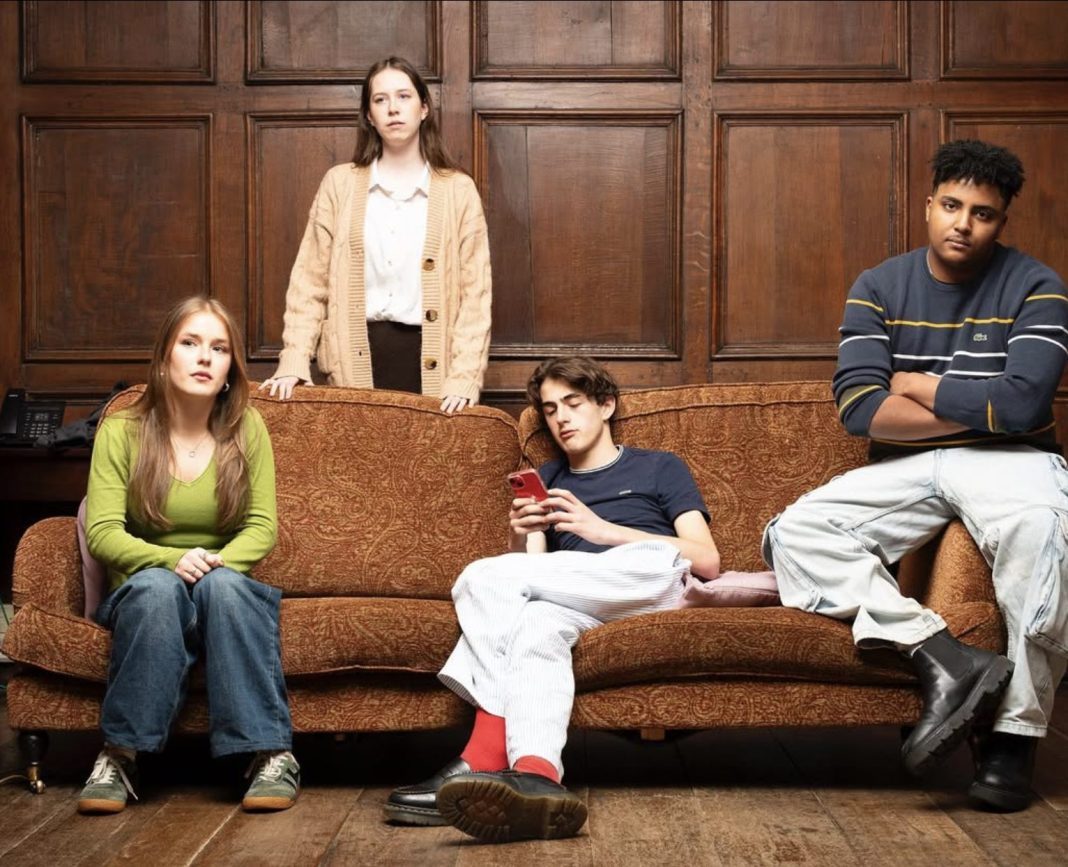There’s a particular theatrical magic that comes from two people simply talking in a room. No stage tricks, no elaborate plot devices – just language, chemistry, and the slow unveiling of character. Juliet Taub’s An Anthology of Pairs leans into this stripped-back power, offering three duologues that still feel more sprawling and expansive than many plays with a full cast and multiple set changes. What begins as a conversation between lovers blooms into a meditation on faith, culture, womanhood, and the hard-earned wisdom of generational conflict. It is a masterclass in intimacy, both emotional and theatrical, quietly echoing the kind of psychic architecture Virginia Woolf spent her life mapping – the way rooms, and what’s said inside them, shape who we are.
We open with Rach and Tai – university students wrapped up in the sweet, familiar mess of early love. The scene unfolds in Rach’s student accommodation (the university itself is never specified). The audience’s position feels almost voyeuristic – like we’ve wandered into the living room of two real people and haven’t yet been asked to leave. Rach (Caeli Colgan) and Tai (Ezana Betru) have an undeniable spark that makes the early back-and-forth jokes about boring essays and awkward professors feel improvised, even lived. But Taub’s script knows exactly where it’s going. The lightness curdles slowly, and before we realise it, we’ve stumbled into a minefield.
Rach, culturally Jewish but spiritually adrift, bristles at Tai’s relationship with Islam, which she sees as selective, even convenient. Tai shoots back, accusing Rach of weaponising the very people-pleasing persona she claims is just self-effacing. The debate is painful in its realism: not polished, not didactic, but jagged, like all good arguments are. They circle questions of compromise, of who is allowed to change and why. The most powerful tension isn’t between their religions but between how religion lives inside each of them: part inherited, part chosen, all tangled.
Then it happens – they say they’re each other’s favourite person. For a second, you believe that maybe this is the part of the story where things work out. But Taub is far too honest for that. Love, An Anthology of Pairs reminds us, is not always enough to outrun difference. They break up, and you’re left dazed in the silence that follows, like the moment after a door clicks shut. Familiar, final, and oddly private.
A scene change jolts us: we’re in an airport. A new pair, a new room. Rach’s mother, Sarah, played with aching restraint by Lorna Campbell, is crying next to a stranger – the character of Mike (Luke Bannister). Mike is a witty, slightly jaded gay man who introduces himself as a freelance journalist, though we suspect the “freelance” part might be doing a lot of heavy lifting. The scene begins like a setup for a joke: woman crying in an airport, man offers tissues, and yet what unfolds is a beautifully paced unravelling of Sarah’s life.
Campbell’s Sarah is a study in contradiction: devout but disillusioned, maternal yet deeply lonely, fiercely intelligent but emotionally stunted by years of silence. Her line, “I love my husband the same way I love the colour of my childhood bedroom” is a tiny detonation – equal parts nostalgia and resignation. Mike, with his outsider status, becomes the unlikely confidant she never knew she needed. Bannister keeps the tone light without ever flattening the stakes; his charm masks the same bruises Sarah carries, just arranged differently.
This middle scene is the play’s most formally traditional, even a touch sentimental in its “strangers sharing secrets” dynamic. But it earns its pathos. As Mike gently prods Sarah, asking the quietly devastating, “Do you like your daughter?” we begin to see the cracks that stretch far beyond the mother-daughter disagreement over God or culture. Sarah’s religious life is both her shield and her shackle. Her children don’t speak to her. Her husband won’t talk about her affair. The silence between them is deafening, and its weight hits all the harder now that we understand the agonising roots of Rach’s own estrangement.
In the final scene, five years later, Sarah visits Rach in a new apartment. Time has passed, but the wounds haven’t scabbed over entirely. This is no Hollywood reunion. There are olive branches, yes, but also barbs. Half-sincere jokes about dietary restrictions, failed relationships, and what it means to believe in anything. Sarah, still devout, wonders aloud whether she still has a place in Rach’s life if Rach no longer believes in God. It’s the play’s central question, and perhaps its most quietly devastating one. If our parents represent the foundations of our world, what happens when we remodel? Can love outlast the scaffolding?
Visually and technically, the production leans into its minimalism: two chairs, a single bed, some austere stage lighting, and the occasional offhand sound effect. It doesn’t need any more; the conversations are the spectacle. In an era of high-concept theatre and maximalist sets, An Anthology of Pairs embraces the quiet and lets it resonate. It is, above all, a play about dialogue. Not the performance of talking, but the real thing, the kind that’s hard, unfinished, sometimes cruel, often necessary. It reminds us that conversation can be an act of love, an act of violence, or both. It shows us that outgrowing our parents is not a victory or a betrayal. It’s just growing. And growth, as this play so tenderly shows, is rarely tidy.
What makes An Anthology of Pairs truly remarkable is that it never seeks to answer the tough questions it raises. Instead, the play sits with them. Leaves them to breathe and ache. Juliet Taub doesn’t offer neat resolutions, nor does she romanticise despair. Her characters are flawed but never trivialised, each trying to do their best with the tools and traumas they’ve inherited. The play doesn’t moralise or proselytise. It listens. And in that act of listening, it becomes quietly radical.


